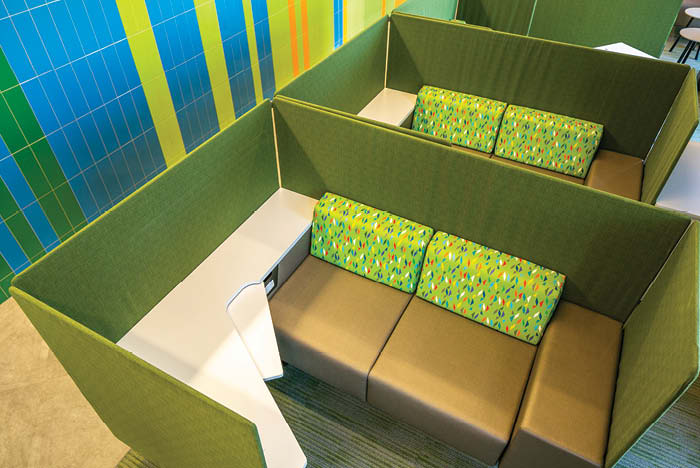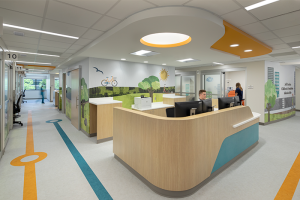Clinic picks furnishings with flexibility

Exchange Work Pods create private but spacious seating areas for patients and families.
Image courtesy of Allseating
Legacy Community Health in Houston has been a fixture in its diverse community since 1990, providing adult primary care, pediatric care, dental health, vision services, behavioral health, maternity care, community outreach, nutrition services and more. It operates several locations in nine different Houston areas, including Gulfton.
The Gulfton facility serves a patient population spanning more than 80 home countries. The 14,000-square-foot campus has seen continuous growth, including more than 300 maternity patients daily. The steady increase in medical appointments made it difficult to accommodate each patient comfortably. Legacy Community Health sought out furniture that would allow it to offer its community a comfortable, professional and high-end facility for their health care needs.
Legacy Community Health worked with design firm Perkins&Will, and Staples as its furnishings dealer. Representatives from the clinic and its partners met with furniture manufacturer Allseating, Mississauga, Ontario. After touring Allseating’s facility and learning about its products, Legacy Community Health selected the Exchange line of products.
The Exchange line, especially the Exchange Work Pods, provided Legacy Community Health with the flexibility to create more space for its patients while aiding in privacy and accommodating the facility’s small footprint. The modular furniture can be arranged to make several configurations best suited to the needs of a given space.
For instance, Exchange Work Pods with dividers can be arranged into booth-style seating to accommodate larger families while giving privacy. Legacy Community Health also added Foster Benches from Allseating as a complementary product for additional seating in waiting areas and in-between spaces.
The switch in furnishings and layouts vastly increased the Houston facility’s capacity. From the seating perspective, areas that could previously seat one to two people at most are now able to comfortably seat up to five.
Joel Kalmin, director of facilities planning at Legacy Community Health, says it also helped to enforce the space as a supportive environment for patients and families.
“With over 50 languages spanning our patient population, the community we serve is incredibly culturally diverse,” Kalmin says. “As we explored our vision for the future of the facility, we noticed a common theme amid the diversity: the importance of family. Most people don’t come to the facility alone; they bring their kids, their spouse, mother, sister or other family members. This is exactly why we ultimately moved forward with Allseating’s Exchange seating.”
Given their small space footprints, Exchange Work Pods provide private, yet highly space-efficient areas for doctors to meet and consult with patients, especially in the absence of an exam room. In these compact spaces, doctors are able to accommodate a variety of patient needs.
Exchange Work Pods can be easily arranged and rearranged should space needs change in the future. The new seating has helped to revolutionize the way the space, and the clinical professionals within it, function.
“In this community, people don’t want to sit alone,” Kalmin says. “Exchange gave us the opportunity to create a supportive environment that allows patients to sit with their families. Instead of individual seating, we can configure and extend Exchange into bench seating or a private pod, which also increases the capacity of the facility as a whole. Using Exchange allowed us to accomplish our goal of making the facility more agile and family-focused.”
Allseating was inspired by the work and community outreach of Legacy Community Health and made a donation to the clinic’s Little Readers program, which is an initiative that creates a reader’s corner for each one of its facilities.
“We came across Allseating’s Jif model as the perfect seating option for the reader’s corner,” Kalmin says. “It was out of our budget, but Allseating donated it to us. In tandem with Staples, Legacy Health’s volunteer team had children and parents from the original facility make drawings and paintings, which were then turned into a 9-yard panel that got printed on the vinyl used to upholster the Jif stools in the reader’s corner. Not only did this support the reader’s corner initiative, but it also further boosted the community atmosphere we were working to capture in this project.”




